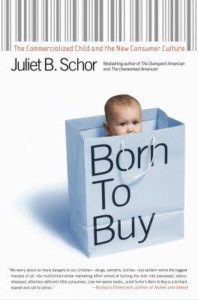 Concerned about the influence of consumerism on your family? Consider reading Born to Buy, a well-researched book focusing on the relationship between children and consumerism. I have read a couple of Schor’s books over the years, and have found them to be very enlightening. This particular book was first published in 2004, but is even more relevant now than it was a decade ago.
Concerned about the influence of consumerism on your family? Consider reading Born to Buy, a well-researched book focusing on the relationship between children and consumerism. I have read a couple of Schor’s books over the years, and have found them to be very enlightening. This particular book was first published in 2004, but is even more relevant now than it was a decade ago.
The beginning of the book gives a historical perspective on how marketing to children has changed over the last century. From World War 1 to World War 2, parents were the primary target for children’s products. But the advent of television, with programs developed specifically for children (such as the Mickey Mouse Club and Saturday morning cartoons), presented advertisers with the ideal medium to entice children to their products. Today, children are marketed (and targeted) directly.
Schor cites a number of studies that show children are more involved than ever in family purchasing, at a level unprecedented in previous generations of children. They have a personal investment, identity-wise, in what brands and products the family purchases, and how they are viewed by peers as a result of those purchases. Marketing strategies used to influence children include messages such as (1) adults and/or parents are “uncool,” and (2) older children (teens) are perfect role models to emulate.
This autonomy takes a toll—children don’t have the life experience or maturity that comes with age to differentiate between needs and wants. They come to believe that they need the products, and that exhibiting antisocial behavior is the best way to get them. According to Schor, psychologists have found that adopting materialistic values undermines well-being, and leads to depression, anxiety disorders, and risky and/or disobedient behavior.
Children are very susceptible to marketing. Advertising campaigns are targeted towards specific psychological areas where children are weakest. Ads zero in on areas of insecurity, such as the desire to be popular. Market researchers use multiple avenues to reach youth buyers, even insinuating themselves into schools.
We are also seeing more parental acceptance of youth-targeted marketing such as age-inappropriate clothing and entertainment choices for children. Advertisers actually have an acronym for this development (KAGOY), which stands for Kids Are Getting Older Younger.
What does all of this yield? Many children wind up addicted to media and consumerism. Schor presents research data outlining this, and the results are scary:
• exposure to consumer culture is directly related to a greater tendency to lie, to cheat, to steal,
• to be overweight,
• to reject parental authority and guidance,
• to be violent,
• to exhibit signs of greediness.
Bottom Line
Schor doesn’t just illustrate that kids have become overly materialistic; she shows that kids who are heavily involved in the values of consumerism wind up becoming problem kids. This should be a concern for everyone, regardless of their age and/or parental status.
